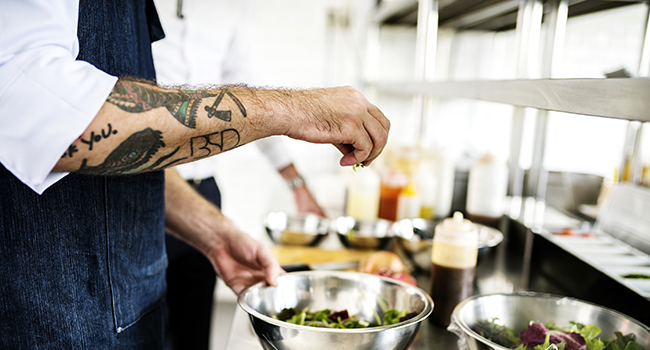A sports coach’s pre-game meeting often determines the quality of the team’s played and the numbers on the final scoreboard. By the same measure, pre-shift meetings influence the quality of each shift in the restaurant.
The truth is, many restaurants don't have pre-shift meetings, and some that do still don't have a solid system or strategy around how they do it. Many restaurant managers think of pre-shift meetings as a necessary evil. They make it boring and glum by merely talking about new specials, 86’d items, and pointing out the negatives, like wrong uniform or schedule issues. Some even use this opportunity to reprimand their team in front of their peers, which flies in the face of the purpose pre-shift meetings.
Here are some strategies and practices to make your pre-shift meetings more profitable, organized, and purposeful, rather than dreadful and disengaging for you and your team.

Open with a bang
Good books start with an engaging story, pose a question or give an example to draw readers in. Professional speakers will often start with a joke, a quote, or “imagine” scenario to break the ice and get the audience loosened up. This approach also works for pre-service meetings.
Eliminate: “How is everyone?” If you notice, most of your team members don’t even respond to this greeting, and if they do, you usually get a similar flat response back. This does not create engagement because it simply isn’t genuine. Instead, greet each person individually and thank them for being there.
This makes each person feel seen, acknowledged and valued. Tell a quick story, acknowledge someone for making in a difference, pose a question or give an example of a great experience you had at a different restaurant.
No more than 15 minutes
Make your pre-shift meetings no longer than 15 minutes. This is enough time to inform and engage. Most of us have a short attention span anyway, due to the countless distractions coming at us all the time. Keep your meetings short and sweet if you want to keep the attention of your staff.
Prepare in advance
Prepare your talking points in advance and have an agenda sheet with all attendees’ names, daily goals, sales numbers, sales contests, menu specials, ideas and events. Document what was covered in each meeting and follow up on any assignments that were given out. After each meeting, keep these agendas in a binder as a business document to refer to later if and when needed.
Inform your team
Pre-service meetings are a good opportunity to let your staff know about any current and upcoming local events which may affect your restaurant sales, a conference, sporting event or a concert. Give suggestions on how to best anticipate and capitalize on the new business these events can bring.
Go over daily menu and drink specials, limited availability dishes or drinks, promotions and any special occasions being celebrated that you know of. This is a good time to let your team taste the new item on the menu, go over its details and the best way to sell it to guests.
Include Front of House & Back of House
A common error in how pre-service meetings are conducted is only including people who come in direct contact with guests, such as your servers. The truth is, there's a lot going on behind the scenes that influences the flow of the service and the success of servers. All departments in a restaurant are interdependent, and thus, important.
Include your kitchen crew, bartenders, bussers and the remaining managers in the pre-shift meeting as much as possible. Let each department know how they can support each other and that they are an integral part of others’ success and progress. Restaurants run well when Front Of House and Back Of House work in sync and are invested in each other’s success.
Including all departments in the pre-shift meetings unites everyone and focuses them on a common goal. It also eliminates the “us vs them” mentality that’s present in most restaurants between front of the house and back of the house teams.
Know your numbers
A big part of a restaurant manager’s job is to maximize revenue and manage cost. Pre-service meetings are an opportunity to get your team invested in the restaurant’s sales goals. Before each pre-service meeting, make sure you know your budgeted sales for the shift and for the day, broken down by category (food, liquor, merchandise, etc).
The same way that a football coach will create plays to drive the ball to the end zone, a restaurant manager creates opportunities to maximize sales in each area of the restaurant.
Take time during these meetings to direct your staff the same way as a coach would. Example: If Julie’s station is the closest to the entrance, let her know that between her rounds she has the opportunity to help the host greet the guests when the line of guests starts forming at the front door. She can also sell drinks to the waiting crowd before they even get seated.
This is how you make and maximise sales!
Have teachable moments
Many restaurants stop educating and developing their staff after the initial new hire training. The truth is, even though your employees show up to make money, money alone won’t keep them engaged to stay working at your restaurant.
What keeps people engaged is growth. We, humans need to feel that we are growing and progressing at work. At each meeting create teachable moments. Give out hospitality resources, effective sales techniques, efficient side work tips, history of your restaurant, industry developments, skills training etc. Take few minutes at each meeting to educate and pour value in to your team.

Give credit to your team
Most restaurant employees are rarely praised for their efforts and often only noticed for their mistakes or shortcomings. Yet, the biggest need we humans have is the need to be seen and acknowledged. At each meeting find at least three people to give credit to. No contribution is too small to recognize your team for.
Whether it’s getting through a big rush with minimal bad meals, or helping a fellow server with their sidework, make sure to recognize your team for it. Don't just say “good job”, let them know exactly what they did and how they made a difference.
For example: “Jason, the way you were calling out the orders and communicating with your team in the kitchen last night really helped all of us get through the rush smoothly and made us shine in our guests eyes. Thank you for leading and taking on such an important role! You really made big difference.”
Also, ask each person to take this opportunity and thank someone on the team. This will help create a positive habit amongst your team of noticing and rewarding positive behaviors and attitude. The result: what gets rewarded gets repeated.
Open floor
Make sure you’re not the only one talking. Open the floor for questions, ideas or suggestions. But, don't say, “Do you have questions?”. Become great at asking open ended questions that are specific to a situation or an event.
Example: “What were the most challenging parts in getting guests intrigued about our newly released menu?”, or “Which part of the new scheduling software is the most or least useful to you?”. Open ended questions create the most fruitful ides and conversations.
Close with something fun
And lastly, close the meeting with something uplifting. Don't say: “Have a good shift”, or “thanks everyone”. A manager I worked with used to say: “You all are already great, only thing left to do is to do great things!”
.png?width=996&name=Typsy%20%20We%20teach%20hospitality%20to%20the%20world%20%20typsy.com%20blog%20banner%20_%20(1).png)
With some of these tips your meetings should hopefully be more productive and leave your team feeling motivated, aware and ensure that everyone is on the same page.
Start your online hospitality training with Typsy, and watch our course on an Introduction to hospitality management.
 |
Anna Dolce is a life and business strategist, restaurant and small business expert, writer and speaker. Anna helps restaurant owners and various entrepreneurs grow their businesses and get the most out of their lives. Anna has spoken from the TEDx stage, major conferences and industry shows on the topics of service vs. hospitality, entrepreneurship, leadership and restaurants. Visit annadolce.com to get in touch. |
You might also like: